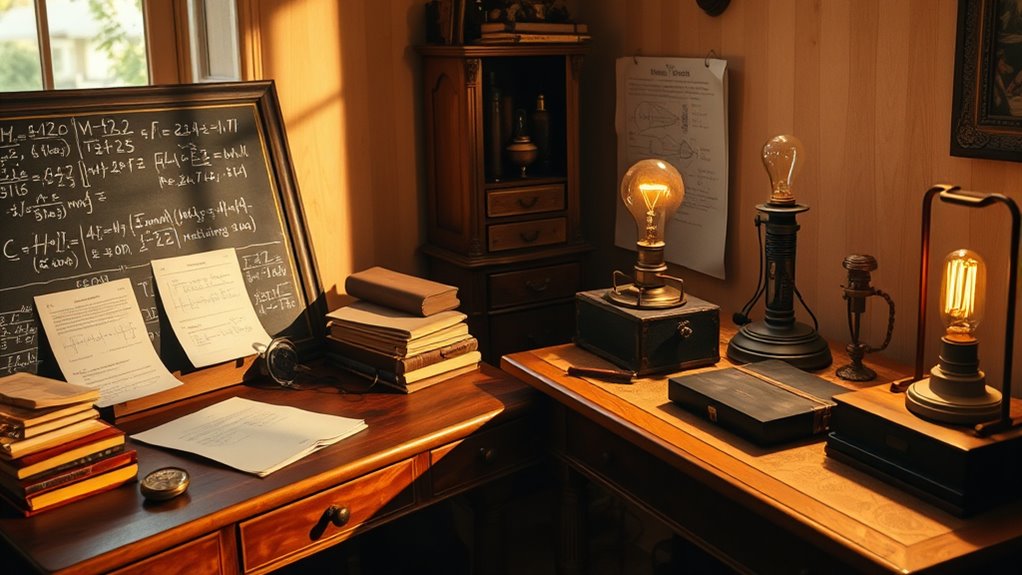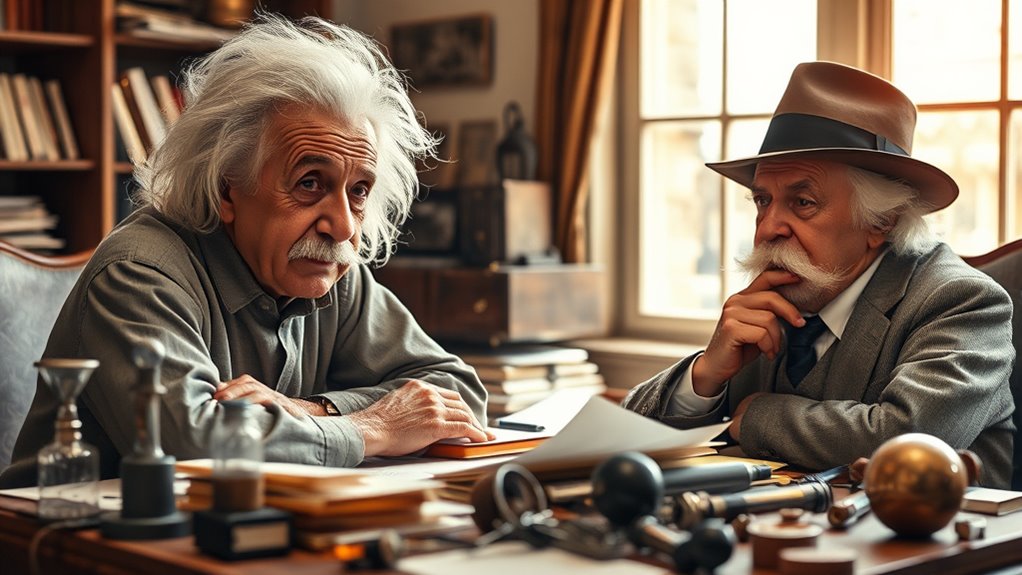You often hear quotes attributed incorrectly to Einstein and Edison, but many are myths or misattributions. For example, Einstein’s famous “God does not play dice” quote was actually from a letter, not a speech, and Edison didn’t invent the lightbulb but improved it. To truly understand their contributions, you need to verify sources and recognize these misconceptions. If you keep exploring, you’ll discover the real stories behind these iconic figures.
Key Takeaways
- Many famous quotes are misattributed; verifying sources reveals who truly said them.
- Einstein’s “God does not play dice” originates from a 1926 letter, not a direct quote.
- Edison is often credited with inventing the lightbulb, but he mainly improved existing designs.
- Proper attribution requires checking original documents to avoid myths about their statements.
- Deep research uncovers the true scope of Einstein’s and Edison’s contributions beyond popular misconceptions.

Many people mistakenly attribute certain inventions and ideas to Einstein and Edison, often oversimplifying their true contributions. This tendency can distort the understanding of their actual roles in history and lead to misconceptions. When exploring their legacies, it’s essential to maintain historical accuracy and verify quotes carefully, as misattributions can spread misinformation. Sometimes, a famous quote is wrongly linked to one of these figures, fueling the myth that they originated a particular idea or statement. To avoid falling into this trap, you need to cross-check sources and rely on credible references. Proper quote verification helps guarantee you’re not perpetuating false narratives about their achievements or beliefs.
Verify quotes and sources to avoid misconceptions about Einstein and Edison’s true contributions.
For example, many credit Einstein with the phrase “God does not play dice,” but historical accuracy shows he never said those exact words. The quote actually comes from a letter Einstein wrote in 1926, expressing his discomfort with the randomness in quantum mechanics. Still, over time, the phrase has been paraphrased and misattributed, leading some to think Einstein endorsed a deterministic universe outright. Similarly, Edison is often credited with inventing the lightbulb, but his role was more about improving existing designs and commercializing electric lighting. The real pioneers of the incandescent bulb, like Joseph Swan and others, played vital roles that often get overshadowed by Edison’s fame. Recognizing the correct attribution of inventions helps clarify their true contributions.
Your challenge is to recognize that these figures are often simplified into caricatures of their true work. Einstein, for example, revolutionized physics with his theory of relativity, but his involvement in other scientific areas was less direct. Edison’s contributions spanned from phonographs to electrical systems, yet his most famous achievements are sometimes exaggerated or misrepresented. To truly grasp their impact, you should seek out reliable sources and scrutinize claims—don’t just accept popular attributions at face value. Verifying quotes and understanding the context behind their inventions helps you appreciate the real scope of their work, rather than the myths that have grown around them.
In essence, respecting the importance of historical accuracy and quote verification allows you to form a more truthful picture of these inventors. It’s tempting to attribute a catchy quote or a groundbreaking invention to the most famous figure, but doing so often simplifies complex histories. Instead, by digging deeper, you gain a clearer understanding of their true contributions. This approach not only corrects misconceptions but also enriches your appreciation for the genuine ingenuity behind their achievements, without the distortions of legend.
Frequently Asked Questions
Are There Any Verified Quotes That Einstein and Edison Actually Said?
When considering whether there are verified quotes from Einstein and Edison, you focus on historical accuracy and quote verification. Many famous sayings are often misattributed, so it’s essential to check credible sources. You can find verified quotes by consulting reputable biographies, archives, or direct writings. While some quotes are genuinely theirs, others might be misattributed, so always verify before accepting or sharing a quote as authentic.
How Do Misattributions Impact Public Perception of These Inventors?
Imagine a clear pond disturbed by a stone’s splash—misattributions shake the image of Einstein and Edison, muddying historical accuracy. When false quotes spread, they distort how people see these inventors, making their true contributions fade like ripples. This skewed public perception can diminish respect for their genuine achievements, reinforcing misconceptions instead of highlighting their real insights. Accurate stories build a clearer picture of history, honoring their true legacy.
What Are the Most Common Sources of Einstein and Edison Quote Misattributions?
You should recognize that source confusion often leads to quote distortion, which is a common cause of misattributions. When quotes are shared without clear origins, people might incorrectly attribute them to Einstein or Edison. Media, social sharing, and paraphrasing can all contribute to this confusion, making it seem like these inventors said things they never did. To avoid spreading false info, always verify quotes with reliable sources.
Have Any Famous Quotes Been Officially Attributed to Both Einstein and Edison?
You might wonder if any famous quotes are officially attributed to both Einstein and Edison. Generally, historical inaccuracies and quote authentication issues mean that most quotes are wrongly linked to these figures. While some sayings are popularly attributed to both, careful verification shows they’re often misattributions rather than confirmed statements. Always check credible sources, as many well-known quotes lack solid proof of origin from either Einstein or Edison.
How Can I Verify if a Quote Is Genuinely From Einstein or Edison?
When verifying if a quote is genuinely from Einstein or Edison, focus on source verification and quote analysis. Check reputable sources, official writings, or speeches to see if the quote appears there. Be cautious of popular attributions, as they often get misattributed over time. Cross-reference multiple credible references, and consider the context to guarantee the quote aligns with their known ideas or statements.
Conclusion
Now, as you navigate the world of quotes, remember that not everything you see on the internet is gospel. Like mistaking Edison for the inventor of the light bulb when he actually improved it, misattributions can light up false ideas. Always double-check your sources—think of it as avoiding a Pandora’s box of misinformation. By doing so, you keep the truth shining bright, much like a vintage Edison filament glowing steadily in your mind’s eye.










